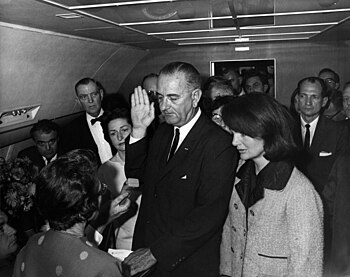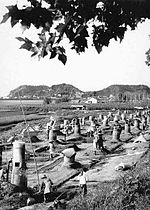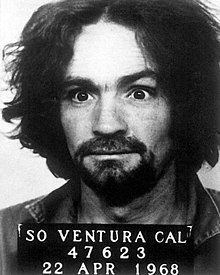Portal:1960s
The 1960s Portal
The 1960s became synonymous with the new, radical, and subversive events and trends of the period. In Africa the 1960s was a period of radical political change as 32 countries gained independence from their European colonial rulers. Some commentators have seen in this era a classical Jungian nightmare cycle, where a rigid culture, unable to contain the demands for greater individual freedom, broke free of the social constraints of the previous age through extreme deviation from the norm. Christopher Booker charts the rise, success, fall/nightmare and explosion in the London scene of the 1960s. However, this alone does not explain the mass nature of the phenomenon. Several nations such as the U.S., France, Germany and Britain turned to the left in the early and mid 1960s. In the United States, John F. Kennedy, a Keynesian and staunch anti-communist, pushed for social reforms. His assassination in 1963 was a stunning shock. Liberal reforms were finally passed under Lyndon B. Johnson including civil rights for African Americans and healthcare for the elderly and the poor. Despite his large-scale Great Society programs, Johnson was increasingly reviled by the New Left at home and abroad. The heavy-handed American role in the Vietnam War outraged student protestors across the globe, as they found peasant rebellion typified by Ho Chi Minh and Che Guevara more appealing. Italy formed its first left-of-center government in March 1962 with a coalition of Christian Democrats, Social Democrats, and moderate Republicans. Socialists joined the ruling block in December 1963. In Britain, the Labour Party gained power in 1964. In Brazil, João Goulart became president after Jânio Quadros resigned. This is a Featured article, which represents some of the best content on English Wikipedia..
On 27 February 1962, the Independence Palace in Saigon, South Vietnam, was bombed by two dissident Republic of Vietnam Air Force pilots, Second Lieutenant Nguyễn Văn Cử and First Lieutenant Phạm Phú Quốc. The pilots targeted the building, the official residence of the President of South Vietnam, with the aim of assassinating President Ngô Đình Diệm and his immediate family, who acted as political advisors. The pilots later said they attempted the assassination in response to Diệm's autocratic rule, in which he focused more on remaining in power than on confronting the Viet Cong (VC), a Marxist–Leninist guerilla army who were threatening to overthrow the South Vietnamese government. Cử and Quốc hoped that the airstrike would expose Diệm's vulnerability and trigger a general uprising, but this failed to materialize. (Full article...)This is a Good article, an article that meets a core set of high editorial standards.
Dr. No is a 1962 spy film directed by Terence Young. It is the first film in the James Bond series. Starring Sean Connery, Ursula Andress, Joseph Wiseman and Jack Lord, it was adapted by Richard Maibaum, Johanna Harwood, and Berkely Mather from the 1958 novel of the same name by Ian Fleming. The film was produced by Harry Saltzman and Albert R. Broccoli, a partnership that continued until 1975. It was followed by From Russia with Love in 1963. In the film, James Bond is sent to Jamaica to investigate the disappearance of a fellow British agent. The trail leads him to the underground base of Dr. Julius No, who is plotting to disrupt an early American space launch from Cape Canaveral with a radio beam weapon. Although it was the first of the Bond books to be made into a film, Dr. No was the sixth of Fleming's series, beginning with Casino Royale. The film makes a few references to threads from earlier books, and later books in the series as well, such as the criminal organisation SPECTRE, which was not introduced until the 1961 novel Thunderball. Produced on a low budget, Dr. No was a financial success. While the film received a mixed critical reaction upon release, it has gained a reputation over time as one of the series' best instalments. Dr. No also launched a genre of secret agent films that flourished in the 1960s. The film spawned a comic book adaptation and soundtrack album as part of its promotion and marketing. (Full article...)Selected picture - Lyndon B. Johnson taking the U.S. Presidential Oath of Office on Air Force One following the assassination of John F. Kennedy in Dallas on November 22, 1963. He was sworn in by Judge Sarah T. Hughes, making him the first President sworn in by a woman. Johnson was not sworn using a Bible; none could be found aboard the plane. A Roman Catholic Missal was discovered in Kennedy's desk, and this book was used during the swearing-in ceremony.
Did you know -
Related portalsThis is a Featured article, which represents some of the best content on English Wikipedia..
"Hey Jude" is a song by the English rock band the Beatles that was released as a non-album single in August 1968. It was written by Paul McCartney and credited to the Lennon–McCartney partnership. The single was the Beatles' first release on their Apple record label and one of the "First Four" singles by Apple's roster of artists, marking the label's public launch. "Hey Jude" was a number-one hit in many countries around the world and became the year's top-selling single in the UK, the US, Australia and Canada. Its nine-week run at number one on the Billboard Hot 100 tied the all-time record in 1968 for the longest run at the top of the US charts, a record it held for nine years. It has sold approximately eight million copies and is frequently included on music critics' lists of the greatest songs of all time. The writing and recording of "Hey Jude" coincided with a period of upheaval in the Beatles. The ballad evolved from "Hey Jules", a song McCartney wrote to comfort John Lennon's young son Julian, after Lennon had left his wife for the Japanese artist Yoko Ono. The lyrics espouse a positive outlook on a sad situation, while also encouraging "Jude" to pursue his opportunities to find love. After the fourth verse, the song shifts to a coda featuring a "Na-na-na na" refrain that lasts for over four minutes. (Full article...)This is a Good article, an article that meets a core set of high editorial standards.
Fidel Alejandro Castro Ruz (/ˈkæstroʊ/ KASS-troh, Latin American Spanish: [fiˈðel aleˈxandɾo ˈkastɾo ˈrus]; 13 August 1926 – 25 November 2016) was a Cuban revolutionary and politician who was the leader of Cuba from 1959 to 2008, serving as the prime minister of Cuba from 1959 to 1976 and president from 1976 to 2008. Ideologically a Marxist–Leninist and Cuban nationalist, he also served as the first secretary of the Communist Party of Cuba from 1965 until 2011. Under his administration, Cuba became a one-party communist state; industry and business were nationalized, and socialist reforms were implemented throughout society. Born in Birán, the son of a wealthy Spanish farmer, Castro adopted leftist and anti-imperialist ideas while studying law at the University of Havana. After participating in rebellions against right-wing governments in the Dominican Republic and Colombia, he planned the overthrow of Cuban president Fulgencio Batista, launching a failed attack on the Moncada Barracks in 1953. After a year's imprisonment, Castro travelled to Mexico where he formed a revolutionary group, the 26th of July Movement, with his brother Raúl Castro and Ernesto "Che" Guevara. Returning to Cuba, Castro took a key role in the Cuban Revolution by leading the Movement in a guerrilla war against Batista's forces from the Sierra Maestra. After Batista's overthrow in 1959, Castro assumed military and political power as Cuba's prime minister. The United States came to oppose Castro's government and unsuccessfully attempted to remove him by assassination, economic embargo, and counter-revolution, including the Bay of Pigs Invasion of 1961. Countering these threats, Castro aligned with the Soviet Union and allowed the Soviets to place nuclear weapons in Cuba, resulting in the Cuban Missile Crisis—a defining incident of the Cold War—in 1962. (Full article...)Selected article -The Manson Family (known among its members as the Family) was a commune, gang, and cult led by criminal Charles Manson that was active in California in the late 1960s and early 1970s. The group at its peak consisted of approximately 100 followers, who lived an unconventional lifestyle, frequently using psychoactive drugs, including amphetamine and hallucinogens such as LSD. Most were young women from middle-class backgrounds, many of whom were attracted by hippie culture and communal living and then radicalized by Manson's teachings. The group murdered at least nine people, though they may have killed as many as 24. Manson was born in 1934 and had been institutionalized or incarcerated for more than half of his life by the time he was released from prison in 1967. He began attracting acolytes in the San Francisco area. They gradually moved to a run-down ranch, called the Spahn Ranch, in Los Angeles County. The ranch burned down during a Southern California wildfire in September 1970. (Full article...)More Did you know (auto generated)
TopicsCategoriesWikiProjects
Associated WikimediaThe following Wikimedia Foundation sister projects provide more on this subject:
Discover Wikipedia using portals |





























